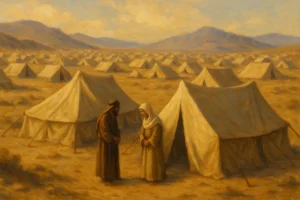Bilam’s Curse Can’t Touch Unity
Bilam, a powerful prophet among the nations, was hired to curse Bnei Yisrael. But each time he tried, Hashem turned his curse into a blessing. What stands out is that Bilam never saw the entire nation—he was only shown part of the camp. The Torah even emphasizes this. Rabbi Yisraeli explains that Bilam hoped to break off a small group and cause damage there. But even in seeing only part, he realized something deeper: the nation was one. When you see one part, you see the whole. Their unity was real and unbreakable.
Bilam vs. Avraham: Two Opposite Forces
Bilam looked for weakness—he focused only on the negative. His whole method was divide and conquer, to isolate the sins. Avraham, on the other hand, looked for good. He acted with kindness, taking responsibility for others even when they didn’t live like he did. Bilam tried to destroy through division. Avraham built through love and connection. Rabbi Yisraeli teaches that this contrast is not just historical—it’s a lesson for us. Our power is in our unity, in staying together and focusing on what is good.
“Mah Tovu”—When Modesty Becomes Holiness
One of the most famous lines in the siddur comes from Bilam himself: “Mah tovu ohalecha Yaakov.” Chazal explain what Bilam saw. The tents of Bnei Yisrael were arranged so that no entrance faced another—not because people were trying to protect their own privacy, but because they were protecting their neighbor’s. It wasn’t about rights. It was about obligations. A nation that lives this way becomes a place the Shechinah (Divine Presence) can rest. That spiritual care for others—that sensitivity and modesty—is what protects us until today.
NOTE: The above is a summary based on the original teaching.

